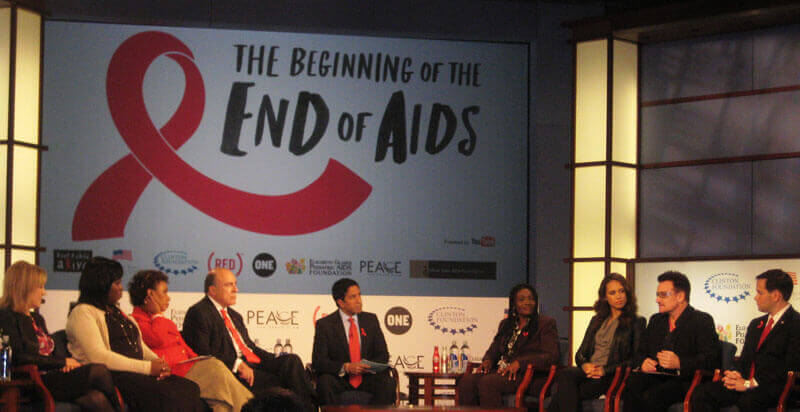Kaitlin ChristensonGHTC
Kaitlin Christenson is director of GHTC.
Yesterday, at an event hosted by ONE and (RED) to commemorate World AIDS Day, President Obama declared the beginning of the end of AIDS: “Today is a remarkable
day. Today, we come together, as a global community, across continents, faiths and cultures, to renew our commitment to ending the AIDS pandemic –once
and for all.” I was honored to join a group of distinguished guests to witness the President’s World AIDS Day address and to hear comments from former
Presidents George W. Bush and Bill Clinton; the current President of Tanzania; and a powerful panel that included a few superstars—Bono and Alicia
Keys—members of Congress, business leaders, and activists.
 The powerful panel that included a few superstars—Bono and Alicia Keys—members of Congress, business leaders, and activists.
The powerful panel that included a few superstars—Bono and Alicia Keys—members of Congress, business leaders, and activists.
For thirty years, the US government has led the fight against HIV and AIDS, and has played an important role in advancing science to better understand HIV and how to prevent, treat, and diagnose infection. Over the last three decades, we’ve witnessed the fruits of that leadership and the longstanding investment US policymakers have pledged to research on HIV and AIDS: from the first AIDS treatment drugs, to this year’s news that medicines to treat HIV infection could actually help prevent it, too.
Yesterday’s speakers reinforced the notion that our commitment to fighting AIDS must not waiver. President Bush declared that when budget constraints exist, we need to set priorities and focus on what works. He added that there is no greater priority than living out the mandate of “to whom much is given, of him much shall be required.” His perspective was reinforced by Alicia Keys, who said, “We have the opportunity to be a global community that leaves the legacy of an AIDS-free generation. If we have the power to, then we must.”
Recent research results show that we have many of the tools we need to forever change the trajectory of the epidemic. But, as Obama said, now is not the time to be complacent. We still lack a vaccine, a microbicide gel, and other tools that could help us win the war against AIDS.
I’m encouraged to see the continued commitment by the Obama Administration to fighting this disease coupled with bipartisan support from congressional leaders like Congresswoman Barbara Lee and Senator Marco Rubio. My hope is that this commitment translates to continued support for research that will lead us to the next generation of tools to fight HIV and AIDS. As Sanjay Gupta, moderator of the event, said, eradicating AIDS is a goal that “allows us to stand at that most perfect union of audacity and achievability.” Will our government rise to the challenge?